
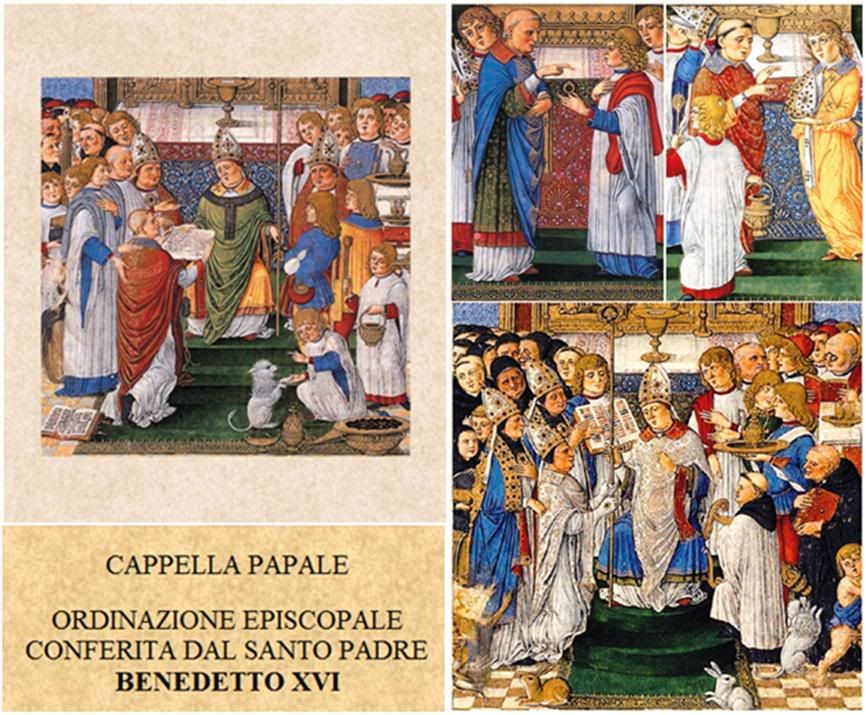 Illustrations: Ordination of a Bishop, Matteo Corvino, 15th cent., Vatican Library.
MASS OF EPISCOPAL ORDINATION
Illustrations: Ordination of a Bishop, Matteo Corvino, 15th cent., Vatican Library.
MASS OF EPISCOPAL ORDINATION

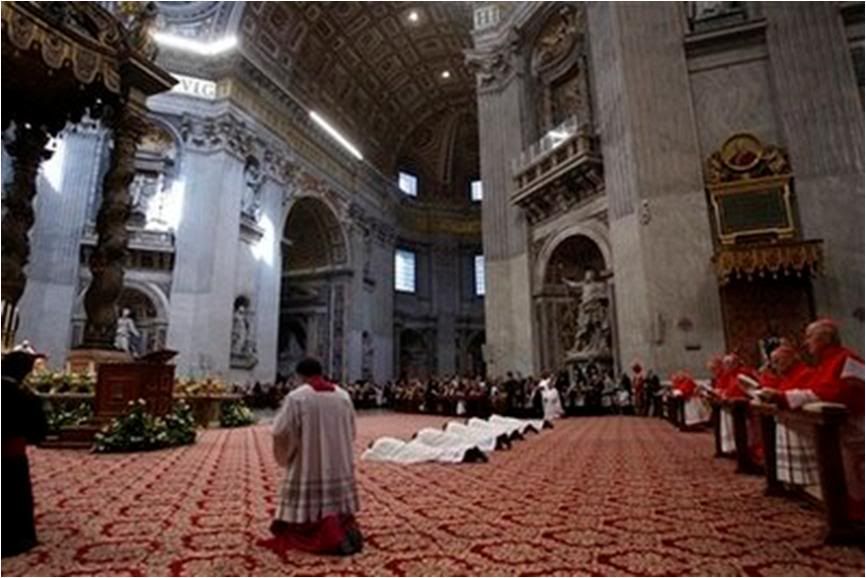
At 10 a.m. today, the Holy Father, Benedict XVI, coming from the summer residence in Castel Gandolfo, presided at Holy Mass in St. Peter's basilica, during which he conferred episcopal ordination on five prelates.
Concelebrating with the Holy Father were the two other ordaining bishops - Cardinal Tarcisio Bertone, Secretary of State; and Cardinal William Joseph Levada, prefect of the Congregation for the Doctrine of the faith; along with the five new archbishops.
After the Mass, the Pope returned to Castel Gandolfo.
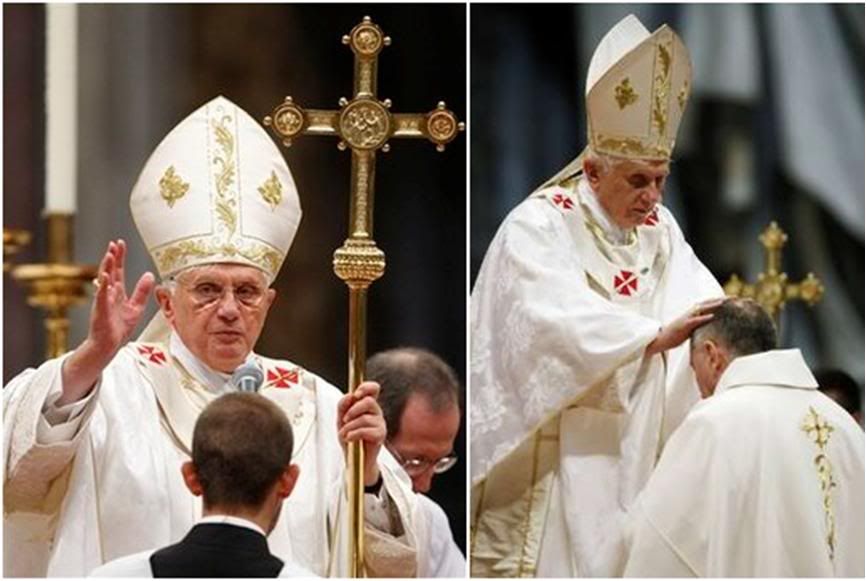
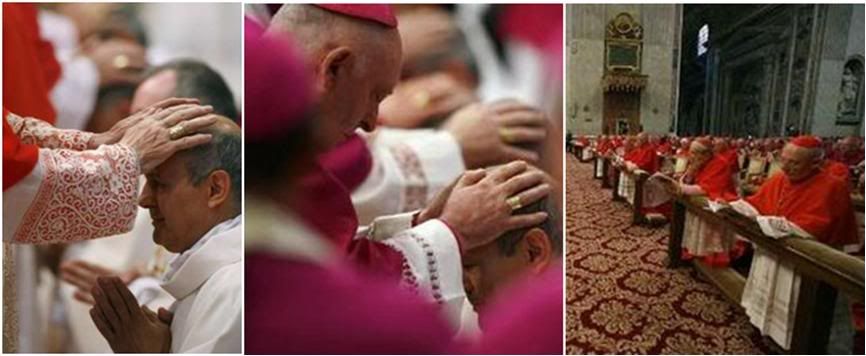
THE HOLY FATHER'S HOMILY
Dear brothers and sisters!
We greet with affection and sincerely unite ourselves with the joy of our five brother priests whom the Lord has called to be successors to the Apostles: Mons. Gabriele Giordano Caccia, Mons. Franco Coppola, Mons. Pietro Parolin, Mons. Raffaello Martinelli and Mons. Giorgio Corbellini.
I am grateful to each of them for the faithful service they have given to the Church, working in the Secretariat of State or the Congregation for the Doctrine of the Faith or the Governatorate of Vatican City State.
I am sure that, with the same love for Christ and the same zeal for souls, they will carry out, in new fields of pastoral action, the ministry that is entrusted to them today with their episcopal ordination.
In accordance with the apostolic tradition, this sacrament will be conferred through the laying of hands and prayer.
The laying of hands takes place in silence - the human voice is muted. The soul opens in silence for God, who reaches out to man, takes him by the hand, and at the same time, cloaks him in his protection so that he now totally belongs to God, and will henceforth deliver men into the hands of God.
But as the second fundamental element of the act of consecration, what follows is prayer. Episcopal ordination is a prayer event. No man can make another a priest or a bishop. It is the Lord himself who, through the words of prayer and the gesture of laying hands, assumes the ordinand totally into his service, draws him into his own Priesthood.
He himself consecrates those who are elected. He himself, the only High Priest, who offered his unique sacrifice for all of us, grants the priest participation in his Priesthood, so that his Word and his work may be present in all time.
For this link between prayer and the action of Christ on man, the Church has developed an eloquent sign in the liturgy. During the prayer of ordination, the Gospel - the book of the Word of God - is opened over the candidate. The Gospel should penetrate into him, the living Word of God should pervade him, so to speak.
The Gospel is not just words - Christ himself is the Gospel. With his
Word, the life of Christ itself should pervade the priest, so that he becomes entirely one with him, that Christ may live in him and give his life form and content.
In this way, what we read in today's liturgy as the essence of the priestly ministry of Christ must be realized in him. The consecrand should be filled with the Spirit of God and live with God as his starting point.
He should bring to the poor the happy news - the true freedom and hope that give life to man and makes him whole again. He should establish the priesthood of Christ among men, a priesthood in the manner of Melchizedek, as a reign of justice and peace.
Like the 77 disciples sent forth by the Lord, he must be someone who brings healing, who helps heal man's interior wounds, his distance from God. The first and essential good man needs is the nearness of God himself.
The Kingdom of God, cited in today's Gospel passage, is not something 'next to' God, or a particular condition in the world: it is simply the presence of God himself, the truly healing power.
Jesus summarized all these multiple aspects of his Priesthood in the statement, "The Son of Man did not come to be served but to serve and to give his life as a ransom for many" (Mk 5,45).
To serve and doing so, give himself; to exist, not for himself, but for others, on the side of God and in the sight of God: this is the most profound nucleus of the mission of Jesus Christ, as well as the true essence of his Priesthood.
Thus, he made the word 'servant' his highest title of honor. With this, he overturned values and gave us a new image of God and man.
Jesus does not come like one of the masters of this world. He, who is the true Master, comes as a servant. His Priesthood is not dominion but service - this is the new Priesthood of Jesus Christ in the manner of Melchizedek.
St. Paul formulated the essence of the apostolic and priestly ministry in a very clear way. In the face of quarrels in the Church of Corinth among different currents inspired by different apostles, he asked: "What is Apollos, after all, and what is Paul? Ministers through whom you became believers, just as the Lord assigned each one" (cfr 1 Cor 3,5).
"Thus should one regard us: as servants of Christ and stewards of the mysteries of God. Now it is of course required of stewards that they be found trustworthy" (1 Cor 4,1-2).
In Jerusalem, on the last week of his life, Jesus himself spoke in two parables about the servants to whom the Lord entrusts his goods in earthly time, stressing three characteristics of serving correctly, in which he also concretizes the image of the priestly ministry.
Let us take a brief look at these characteristics in order to contemplate, with the eyes of Jesus, the task which you, dear friends, are called to assume at this time.
The first characteristic that the Lord demands of his servant is faithfulness. A great good has been entrusted to him that does not belong to him. The Church is not our church, but his Church, the Church of God.
The servant must account for how he manages the good that has been entrusted to him. We do not bind men to us; we do not seek power, prestige, or esteem for ourselves. We lead men to Jesus Christ, and thus to the living God. And with this, we lead them to truth and the freedom that comes from truth.
Faithfulness is altruism, and as such, it is liberating for the priest himself and for those who are entrusted to him. We know how in civilian society, and even in the Church, things go bad when many of those who have been given a responsibility, work for themselves rather than for the community, for the common good.
The Lord sketches in a few lines a portrait of the wicked servant, who carouses and hits his dependents, thus betraying the essence of his responsibility.
In Greek, the word for faithfulness coincides with the word for faith. The faithfulness of the servant of Jesus Christ consists precisely in the fact that he does not seek to adapt his faith to the fashion of the time.
Only Christ has the word of eternal life, and we should bring this word to the people. These words are the most precious asset that he has entrusted to us.
Such faithfulness is neither sterile nor static - it is creative. The master reproaches the servant who hid underground the asset given him in order to avoid any risk. With this apparent faithfulness, the servant has really set aside the master's good so he can dedicate himself fully to his own affairs.
Faithfulness is not fear - it is inspired by love and its dynamism. The master praises the servant who made his goods fruitful. Faith demands to be transmitted: it was not given to us to keep for ourselves, for the personal salvation of our own soul, but for others, for this world and for our time.
We should establish this faith in the world, so that it may become a living force within it, to increase the presence of God in the world.
The second characteristic that Jesus asks of the servant is prudence. Here we must immediately get rid of a misunderstanding. Prudence is different from shrewdness. Prudence, in Greek philosophy, is the first of the cardinal virtues: it indicates the primacy of truth which, through prudence, becomes the criterion for our actions.
Prudence requires humble reason that is disciplined and vigilant, which does not allow itself to be dazzled by prejudices - it does not decide according to desires and passions, but it seeks the truth, even if it is inconvenient.
Prudence means seeking out the truth and acting in conformity to it. The prudent servant is, above all, a man of truth and a man of sincere reason. God, through Jesus Christ, has opened the window of truth to us, since with only our own powers, it often remains quite narrow and only in part transparent.
He shows us in Sacred Scripture and in the faith of the Church the essential truth about man, that which imprints the right direction on our actions.
Thus, the first cardinal virtue of a priest is to allow ourselves to be shaped by the truth that Christ shows us. In this way, we become truly reasonable men who make judgments on the basis of the whole picture and not simply on random details.
Let us not allow ourselves to be guided only through the small window of our own personal shrewdness, but let us look at the world and at men from the wide window on the whole truth that Christ has opened for us, thus recognizing what truly counts in life.
The third characteristic that Jesus points out in the parable of the servant is goodness: "My good and faithful servant....Come, share your master's joy" (Mt 25,21-23).
What is meant by the characteristic of goodness can become clear to us is we think of Jesus's meeting with the rich young man. He had addressed Jesus calling him "Good teacher" and he received Jesus's surprising answer: "Why do you call me good? No one is good but God alone" (Mk 10, 17f).
Good in the fullest sense is God alone. He is Goodness itself, Goodness by nature, Goodness in person. In his creatures - in man - being good is therefore based necessarily on a profound interior orientation towards God.
Goodness grows in uniting oneself interiorly to the living God. Goodness presupposes above all a living communion with God, the Good, a growing interior union with him. Indeed, who better could we learn true goodness from, if not from him who loved us to the end (cfr Jn 13,1)?
We become good servants through out living relationship with Jesus Christ. Only if we live our life in dialog with him, only if his being, his characteristics, penetrate into us and shape us, only then can we become truly good servants.
In the Church calendar we observe today the Name of Mary. In her who was and is totally united to her Son, men in shadows and those who suffer in this world have found the face of the Mother who gives us courage to move ahead.
In the Western tradition the name Mary has been translated as "Star of the sea", which expresses actual experience: How many times does the story of our life seem like a dark sea whose waves strike menacingly at the vessel of life?
Sometimes, the night seems impenetrable, Often, one gets the impression that only evil has power, and that God is infinitely remote. Often, we only get a distant glimpse of the great Light, Jesus Christ who conquered death and evil.
Then we see very near to us a light kindled when Mary says, "Here I am, the handmaid of the Lord". And we see the clear light of goodness that emanates from her. In the goodness with which she welcomes and always meets the great and small aspirations of many men, we recognize in a very human way the goodness of God himself.
With her goodness, she always brings forth Jesus Christ anew, the great Light of God in the world. He gave us his mother to be our mother, so we may learn from her to say the Yes that make us become good.
Dear friends, at this time, let us pray to the Mother of the Lord for you, that she may always lead you towards her Son, the source of every good. And let us pray that you may become faithful, prudent and good servants, so that one day you may hear from the Lord of history himself, "Good and faithful servant, come share the joy of your master". Amen.
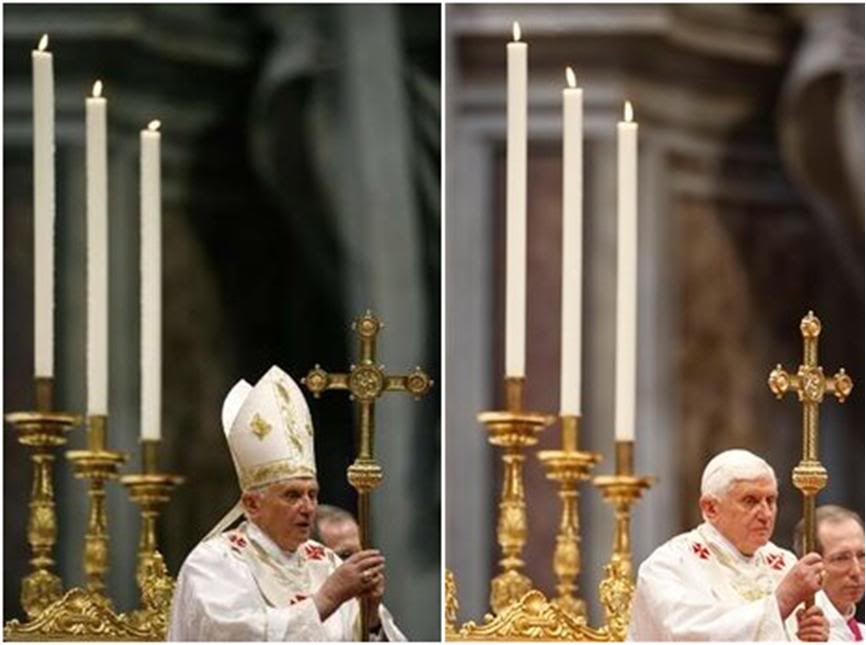
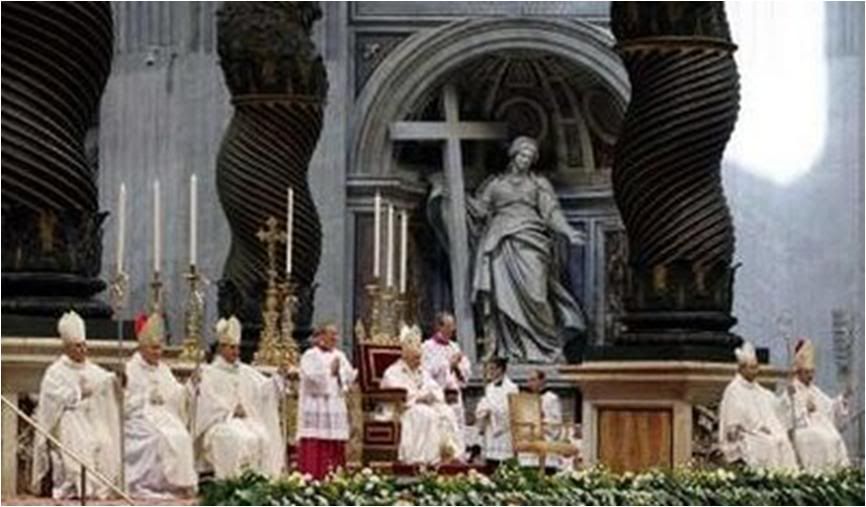 In front of the altar, the new archbishops, who also concelebrated the Mass, are seen flanking the Pope. On the left, from left, Corelli, Parolin and Caccia; on the right, Coppola and Martinelli.
Now the major positions
In front of the altar, the new archbishops, who also concelebrated the Mass, are seen flanking the Pope. On the left, from left, Corelli, Parolin and Caccia; on the right, Coppola and Martinelli.
Now the major positions
at the Secretariat of State
are all Benedict's men
Adapted and translated from

VATICAN CITY, Sept. 12 (Apcom) - Two of the five archbishops consecrated today by Benedict XVI were until recently the fourth and fifth ranking officials of the Vatican Secretariat of State - Mons. Pietro Parolin, who was undersecretary for relations with foreign states, and Mons. Gabriele Caccia, who was senior counselor for internal affairs (in effect, vice minister of this department).
They have been named Apostolic Nuncio to Venezuela and Lebanon, respectively.
Nominated to their positions at State by John Paul II, both had become formidable 'man-machines' within the Vatican bureaucracy and stayed on in their key positions under Benedict XVI even after he named new superiors for them - Mons.Dominique Mamberti as deputy secretary for foreign relations, and Mons. Fernando Filoni, as the deputy secretary for internal affairs (a position called 'Sostituto' in Italian).
Benedict XVI has named the two ex-Curial monsignors, now archbishops, to two very sensitive diplomatic posts, where their long experience in Vatican diplomacy is expected to help the Holy See in its relations with two difficult regimes.
In Venezuela, the bishops have long been at odds with President Hugo Chavez, and in Lebanon, the interests of the Christian community continually need to be protected in a pluricultural country where the other major religious community is Muslim.
The other archbishops consecrated by the Holy Father today are:
Mons. Franco Coppola, also from the Secretariat of State, who has been named Nuncio to Burundi; Mons. Raffaello Martinelli, who leaves the Congregation for the Doctrine of the Faith to become the Bishop of Frascati (Italy); and Mons. Giorgio Corbellini, newly named president of the Vatican's Labor Office.
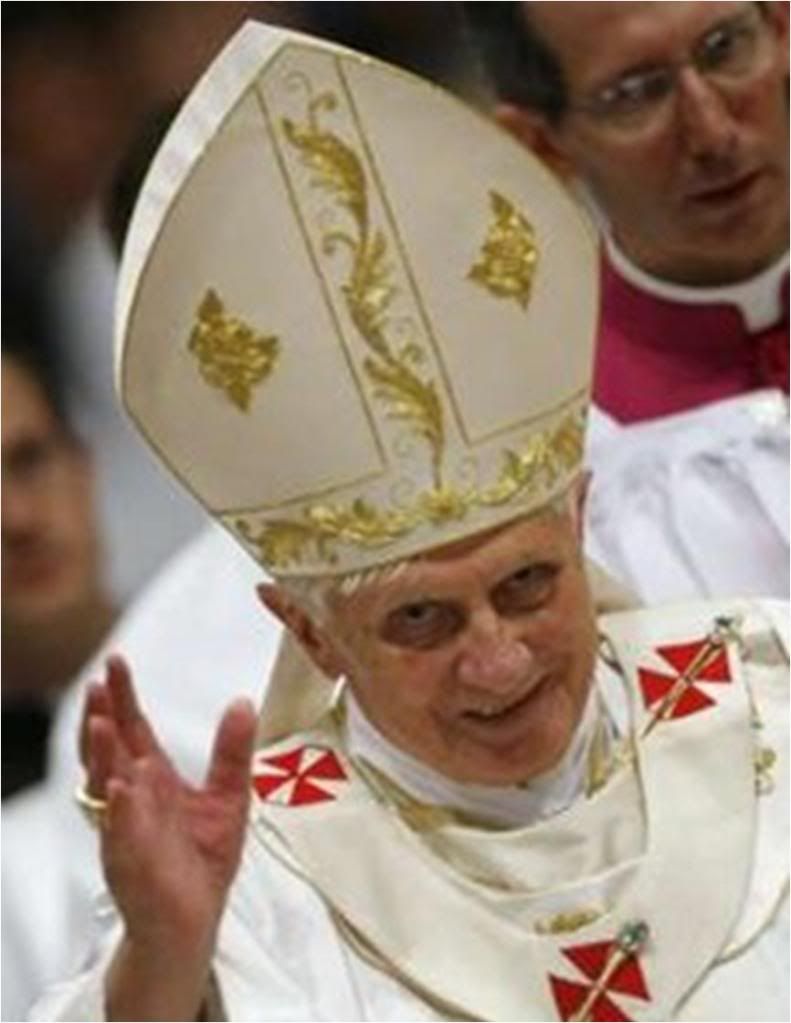
P.S.
For some news details about the Ordination Mass that are not available from other sources, here is a translation of the OR story in the 9/13/09 issue:
The second episcopal consecration
of Benedict XVI's Pontificate
Translated from
the 9/13/09 issue of

It was the second episcopal ordination in Benedict XVI's Pontificate after that of September 29, 2007
[when six new archbishops were consecrated, including Mons Gianfranco Ravasi, earlier named President of the Ponitifical Council for Culture, and Mons. Mieczysław Mokrzycki, who was named Archbishop of Lviv of the Latins in the Ukraine]
Yesterday, the Pope isncribed five new names in the college of bishops, successors to the Apostles: the Italian monsignors Caccia, Coppola, Parolin - named Apostolic Nuncios, to Lebanon, Burundi and Venezuela, respectively; and Martinelli, new Bishop of Frascati, and Corbellini, president of the Holy See's labor office.
All five were previously ranking officials in the Roman Curia.
Benedict XVI has now consecrated 11 bishops, in addition to four he consecrated while he was a Cardinal.
Concelebrants and co-consecrators yesterday were Cardinal Bertone, Secretary of State, and Cardinal Levada, prefect of the Congregation for the Doctrine of the Faith.
Twenty-two cardinals took part in the rites at St. Peter's, including Cardinal Sodano, dean of the College of Cardinals; Cardinal Re, Prefect of the Congregation for Bishops; and Cardinal Vallini, the Pope's Vicar in Rome.
Before the Pope began his homily, Cardinal Re presented the candidate bishops to the Pope who, according to tradition, expressed his acceptance 'gladly'.
The Ordination rite followed the Pope's homily. The candidates stood before the Pope who asked them a series of questions on what they are committed to do as bishops.
During the recitation of the Litany of Saints, the bishops prostrated themselves at the foot of the Altar of Confession. They then got up to return to the altar, where the Pope laid hands on them individually.
The gesture of imposition was subsequently repeated by the two co-consecrators and by the other cardinals and bishops present.
Next, the Pope laid the Book of the Gospel - held open by two deacons - over the head of each bishop, after which he recited the Ordination Prayer.
This was followed by the chrismal anointing, and the presentation fo episcopal symbols to the new bishops: the book of the Gospel, the bishop's ring, the miter and the pastoral staff.
Finally, the Pope bade the bishops to take their seats flanking him in front of the altar. They were greeted with sustained applause from the congregation, as they received teh kiss of peace from the Pope and the other consecrators.
The Mass resumed with the Offertory beginning the Liturgy of the Eucharist. The gifts were offered by family members of the new bishops.
After the Mass, the Pope returned to Castel Gandolfo by helicopter.
The ceremony was very well-attended, including some 100 bishops and archbishops, and dozens of priests who serve in the Roman Curia.
Seated with the diplomatic corps to the Holy See were Mons. Filoni, deputy secretary of state, and Mons. Mamberti, deputy secretary for foreign relations, along with three other new officials of the Secretariat of State - Mons. Wells, who is the new undersecretary-counselor for internal affairs replacing Mons. Caccia; Mons. Balestrero, who replaced Mons. Filoni as undersecretary to Mons. Mamberti; and Mons. Nwachukwu, newly named head of protocol.
Then, the prelates of the Pope's household: Mons. Harvey, prefect of the Pontifical Household; Mons, De Nicolo, his regent; and the Pope's two private secretaries, Mons. Georg Gaenswein and Alfred Xuereb.
Given places of honor were the mayors and local officials of the places linked to the origins and ministry of the new bishops, as well as their families, relatives and friends.
*[The other bishops consecrated in Sept. 2007 were: Monsignors Francesco Brugnaro, Tommaso Caputo, Sergio Pagano and Vincenzo Di Mauro. How different the tenor and tone of the Holy Father's homily on that occasion - when he spoke about the three Archangels (Raphael, Michael and Gabriel) whose feast was celebrated on that day.]
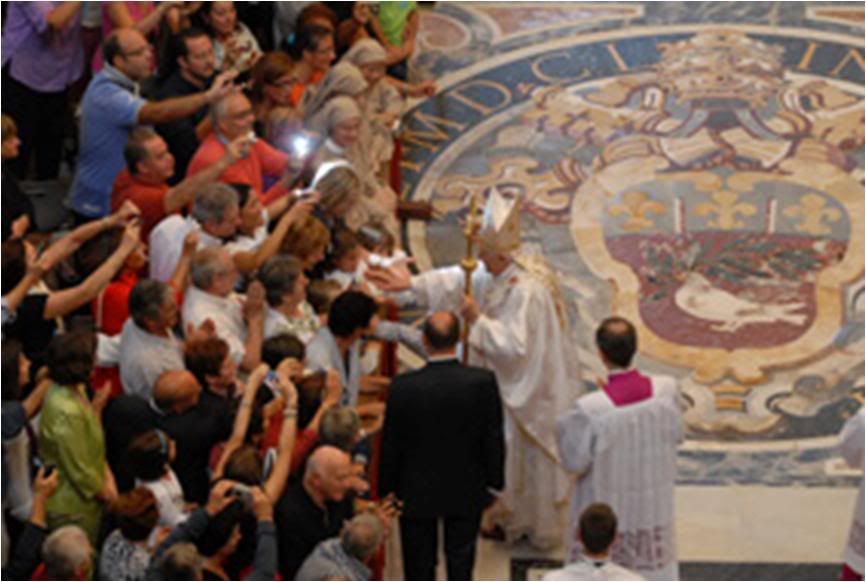
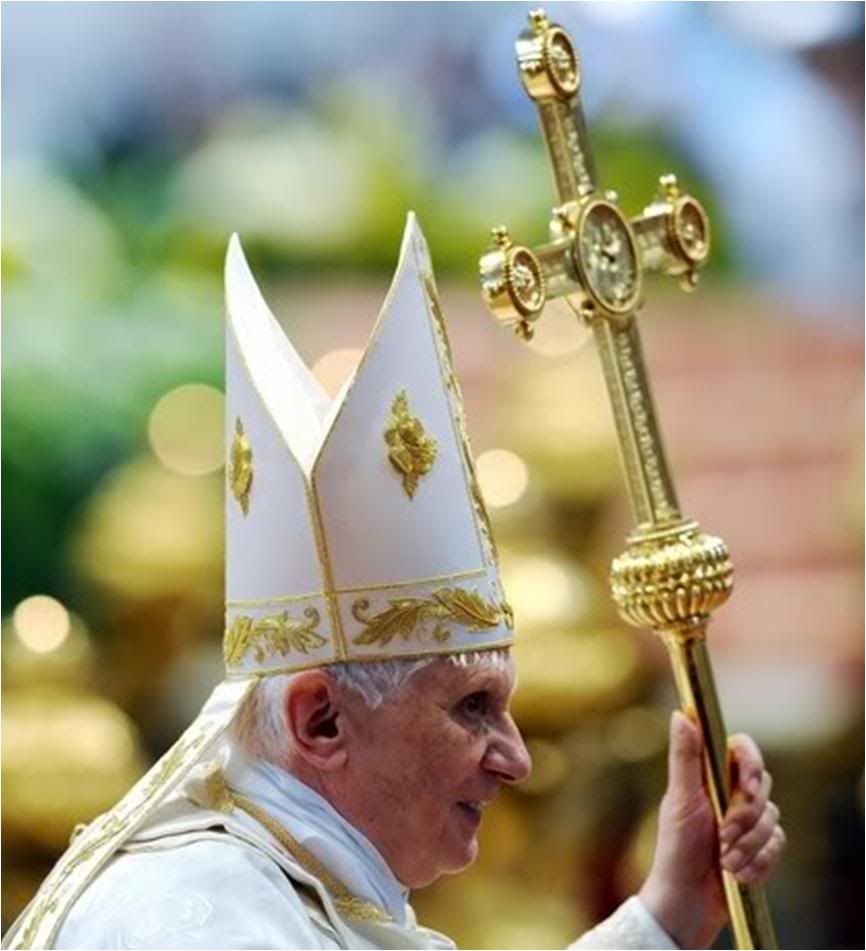
[Modificato da TERESA BENEDETTA 18/09/2009 14:13]